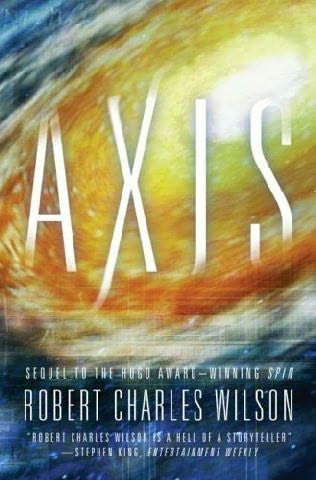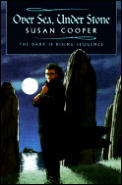I returned to the fantasy genre (as a reader, mind you) a year or two ago, after many years away. It had been an enthusiasm of my youth, something I had put aside, it seems, along with other childish things (ha!). Anyway, last year I re-read C. S. Lewis'
space trilogy (magnificent) and Stephen Lawhead's
Pendragon Cycle (really good). From there I ventured out from the cozy realms of "Christian" fantasy and tried to read George R. R. Martin's Song of Ice and Fire series. It had come highly recommended (the series has a huge and loyal following, and even its own
online encyclopedia), but I only made it through half of the second book before I'd had enough of the sheer depravity on display. Too dark, too vicious, too unrelentingly gross for my tastes, thank you. Sometimes, when you go for a walk, you just have to face the fact that you've taken a wrong turn and go back. And so with books. Maybe the very next chapter would have redeemed the story from its own muck, but I had simply lost hope.
And this brings me to
Memory, Sorrow, Thorn, my current fantasy indulgence. It's a trilogy, of course (fantasy authors hardly ever limit their stories to the strict confines of a single thousand-page tome). The story is somewhat Tolkien-esque, but I don't mean that as a criticism. Tolkien towers over this story-telling medium and his influence would be difficult to elude, even if one wanted to. As I've read these tales, it has occurred to me that the good stories have an obvious
moral center. To put it more precisely, the reader is aware of the moral center of the author, and it is this, above and beyond all of Tolkien's powers of invention, that gives his story true heft.
This is not to say it is clumsily moralistic, only that the worldview of the author is trustworthy. You see this with some of the great novelists of the past, like Dickens and Hugo. And this too is a matter of the reader's own "taste" or predilection, of course. I suggest that we are more influenced by these things in our reading choices than we perhaps realize.
All that aside, I wanted to mention a few things about
Memory, Sorrow, Thorn. I'm into the second book now, called
The Stone of Farewell. The people of this imaginary world are very
religious. Every culture has its gods or God. Most of the human culture, which is roughly equivalent to, oh, maybe 10th century Britain, practice something very like what we moderns imagine Middle Ages Christianity to have been like. They worship a God who seems to have come to earth (or to Osten Ard, the name of this fantasy world) and gotten himself nailed to a tree. People are constantly swearing rather sacrilegiously, and their beliefs seem mostly shallow, superstitious, or hypocritical. At the very least, their religion seems distinctly unhelpful. I'll be curious to see whether all this is just an accessory to the story, window-dressing of sorts, or if there is significant development of this theme.
Anyway, it's a good read. Osten Ard is beautiful and strange, and like Middle Earth it is a world from which magic has not yet fled (of course). In fact, Williams sees his work as a kind of dialogue with Tolkien's masterpiece. You can read more about this series at
Fantasy Finder,
Unsought Input, or in
the author's own website.



